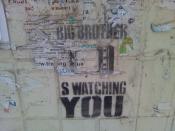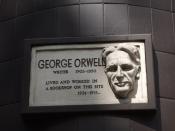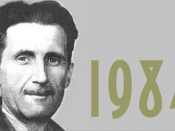In the novels The Fire Dwellers by Margaret Laurence and Nineteen Eighty-Four by George Orwell, the protagonists Stacey and Winston are trapped in their way of life. Both Orwell and Laurence take their main characters through a journey of knowledge, where the protagonists, by looking back at their pasts, communicating with someone in the present and by taking a breakthrough action, are able to express their individuality. In both novels, the authors allow the main characters to express their individuality and gain political or spiritual freedom in the end, but the freedom they gain is not an actual freedom, it is merely an illusion of freedom.
At the beginning of both novels, the main characters are in some way trapped or imprisoned, however, they continue to strive for an acknowledgement of their individuality. In Nineteen Eighty-Four, Oceania has a dictatorship (Big Brother), and is in constant war with Eurasia and Eastasia.
Big Brother's Oceania is a very violent and brutal society where people are forced to conform to the rules of the government, or be imprisoned or killed. Air bombs frequently land on Air Strip One (a city in Oceania where Winston Smith lives). Oceania seems to be in decay, just like humanity and individuality. Oceania has strict sex and relationship laws, dress codes and surveillance. Outer Party members like Winston are constantly being monitored by the "ÃÂSpies', "ÃÂThought Police', and the Inner Party members. Outer Party members are supposed to be kept ignorant, so that they never have the chance to gain control. The Inner Party restricts the Outer Party from being allowed to write and express their thoughts. In the novel The Fire Dwellers, the main character is Stacey MacAindra, a 39-year-old housewife with four children. Stacey is an overly self-conscious woman who always thinks that she is overweight and not attractive, and feels that she is trapped in a boring life that is filled with people who aren't themselves.
"æ Stacey yearns for more openness in others, for a more honest expression of feelings. Her greatest fear is that those around her may be lifeless, may in fact be hollow beneath their perfect masks, that she might be alone in her sense of inner disorder, her explosive undercurrents of feelings, questions, and pain. Her fear is not of the life in others, but of the possibility of lifelessness in others. (Miriam Packer, p. 128) Thus, both characters are trapped or imprisoned in their way of life. However, both Winston Smith and Stacey MacAindra continue to look for freedom and assert their individuality.
The characters, by looking back at their past and communicating/interacting with someone in the present are eventually able to express their individuality. Both Winston and Stacey realize the importance of connecting with their pasts. Winston, who does not remember much of his past, instinctly searches for help from the history of humanity in general. In Oceania, having a diary was wrong and would be punished by death or at least twenty-five years in a forced labour camp. However, Winston realizes that people in the past were allowed to write diaries and were allowed to express their thoughts. So he rebels and purchases a diary because he wants to leave memories to show how his world is very corrupt and controlling, to save the future societies. (Orwell p. 8). Stacey also looks back at her past. She recalls how she used to dance when she was young and starts to dance one day and thus uses her memories as escapes from her oppressive environment and a "ÃÂwindow' to freedom.
At one point in the novel, Stacey, drunk on gin and tonic, dancing alone in her living room, thinks back to the 17-year-old Stacey Cameron she was and defiantly insists on her still-existing life: "I'm not a good mother. I'm not a good wife. I don't want to be. I'm Stacey Cameron and I still love to dance"à(p. 134). And then, as she dances, she lapses into memory: "Stacey Cameron in her yellow dress"æ Every muscle knowing what to do by itself"æ Dance hope, girl, dance hurt. Dance the fucking you've never yet done"à(pp. 133-134). (Miriam Packer, p. 129).
Thus, Stacey reminisces her past and dances to set herself free and express herself. On the road to personal freedom, both Winston and Stacey seek help from not only the past, but also from someone in the present. The protagonists have a need for love, which helps maintain their unique individuality. To have passionate love is the most natural thing for humans. With forbidden love, the protagonists feel a sense of power. Winston falls in love with Julia and feels this will help preserve his individuality and help him endure. Julia gives Winston a love note. "at the sight of the words "ÃÂI love you' the desire to stay alive welled up in him and the taking of major risks suddenly seemed stupid."à(Orwell, p. 115). Winston, who is desperately in need of love, feels that love will help him want to live. Julia is conscious, fit, rebellious and optimistic. Julia's optimism for change is a contrast to Winston's pessimism. She gives Winston hope as she has similar hatred towards the Party. With Julia, Winston is able to express his inner thoughts without the fear of being imprisoned or killed. His individuality is very much accepted by Julia. "Here is a private passion, uncontrolled and unregulated by the party, a passion strong enough to make people act independently and spontaneously."à(Strachey 58). Stacey gets involved in a similar situation. She meets a young writer Luke one day and ends up having sex with him (Laurence, p. 188). She feels relief in talking to Luke. "I've got to see him again"æ it's a necessity."à(Laurence, p. 203). She feels as though she can only express herself to one person which is Luke. Thus, both Winston and Stacey are able to express their thoughts and individuality with the help of someone in the present.
Orwell, in his novel Nineteen Eighty-Four, allows the protagonist Winston to gain a so-called political freedom. Winston has the need for freedom and rents the room above Mr. Charrington's antique store (which is located in the proletarian section of Airstrip One and is prohibited to party members). Winston cherishes tranquility and solitude. He likes to be alone and think by himself. He will do whatever it takes to break the controls and live the life that he dreams of. "It seemed to him that he knew exactly what it felt like to sit in a room like this, in an armchair beside an open fire on the hob, utterly alone, utterly secure, with nobody watching you, no voice pursuing you, no sound except the singing of the kettle and the friendly ticking of the clock."ÃÂ (Orwell, p. 100). This is a very revolutionary act in Winston's political freedom as he finds comforting freedom and solitude in this apartment, which is a forbidden place for Party members. Also, Winston and Julia are invited to a secret meeting at O'Brian's flat. O'Brian, at the time is discovered to be on their rebellious side known as the "ÃÂProles'. "What mattered were individual relationships, and a completely helpless gesture, an embrace, a tear, a word spoken to a dying man, could have value in itself. The proles, it suddenly occurred to him had remained in this condition. They were not loyal to the party or a country or an idea, they were loyal to one another."ÃÂ (Orwell, p. 172). Thus, by becoming a member of the proletarian group, Winston gains political freedom and is able to have thoughts against Big Brother, which is strictly prohibited.
Laurence, also, in her novel The Fire Dwellers, allows the main character Stacey MacAindra to gain spiritual freedom. In the beginning, Stacey is not comfortable with herself. She constantly accuses herself of being a "ÃÂbad mother' and a "ÃÂbad wife'. She feels trapped in a world where no one knows how to communicate or show their true feelings. She on the other hand, wanting to express her individuality, is suppressed by a world full of people who seem unreal to her. However, little by little she begins to realize that the people around her are real. Her affair with Luke, is justified by Mac's affair with Miss Dolores Appleton, helps her realize that she is not the only one with flaws in her character. People like Mac, who seemed emotionless to her, finally start to show some emotions as Mac cries for the first time, holding Stacey in bed after they get home from the morgue where he had to identify his best friend Buckle's body. (Laurence, p. 216).
She has always known herself and been honest with herself, but she has not always been comfortable with herself. Now, knowing that she does not dwell alone in fire and that she cannot control the fires of fate, she is able to accept the losses and knowing that she cannot control those losses, she is freer to celebrate the goodness. (Miriam Packer, p. 129).
Thus, towards the end of the novel, it is evident that Stacey realizes that she's not as trapped as she feels she is.
Although, it seems that in both novels, the main characters are able to express their individuality and gain political or spiritual freedom, the independence or liberty that they gain is purely an illusion. In Nineteen Eighty-Four, Winston Smith at first realizes that everyone in Oceania is being controlled and has no individuality or freedom. He then attempts to liberate himself from the control of the Party by taking many actions that are strictly prohibited. He starts to write a diary, has a relationship with Julia and joins O'Brian's group who he thought to be against Big Brother. However, in the end, both Winston and Julia are captured and prosecuted. Winston is brainwashed into believing everything that Big Brother stands for. Although Winston was presented with freedom and liberty by the author, it was very short-lived and in the end everything is taken away. One of Winston's main goals in gaining freedom is for everyone in Oceania to be liberated. "The moral to be drawn from this dangerous nightmare situation is a simple one: Don't let it happen. It depends on you."à(Myrddin Jones, p. 135). However, Winston's death in the end does not accomplish this goal. Also, Orwell in Nineteen Eighty-Four says, "They would have blown his brain to pieces before they could reclaim it"æ To die hating them, that was freedom."à(Orwell, p. 294). The liberation of the mind through death is a very questionable liberation as no one knows whether or not the mind exists after death. Hence, Winston's "freedom"àwas merely a misapprehension of true freedom. Similarly, in The Fire Dwellers, Stacey in the end is happy with her life and feels liberated. However, everything that she was unsatisfied about has not really changed all that much. One of the things that Stacey really wanted was to have the opportunity to get away from everything and spend time by herself; but she could not do so because of the responsibilities she has towards her children. In the end, she still has the same responsibilities towards her children and is not able to get away. The feeling inside her of being trapped and imprisoned, is not resolved in the end, it is only suppressed.
"æStacey, in true women's magazine tradition, at last decides to damp her fire. She tells her husband she doesn't want to move from their tatty old house, ever, and later, as she is peeling the potatoes, she reflects, "I was wrong to think of the trap as the four walls. It's the world"æfrom now on the dancing goes on only in the head. Anything else, and it's an insult to Katie, whether or not she witnesses the performance."à(Peter Sypnowich- The Toronto Star).
Thus, Stacey's goal of gaining true freedom and ability to assert her individuality is not achieved in the end as she herself decides to keep her thoughts inside her.
The suppressive walls of Stacey's world and Oceania seem to be unbreakable. The authors of both novels tactfully present the main characters with opportunities to express their individuality or gain freedom. However, true freedom is only gained when the liberation or freedom of individuality, lasts an eternity. Although both Winton Smith and Stacey MacAindra gain freedom and are allowed to express their individuality, it is only short lived and in the end, they are left with an illusion of freedom.





